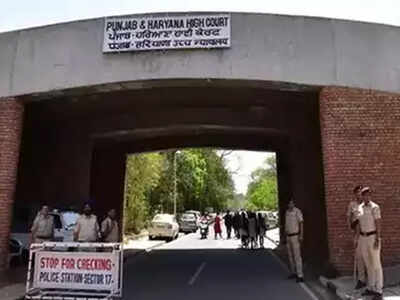
CHANDIGARH: The Punjab and Haryana high court has made it clear that parole or furlough is a reformative process to reinforce the convict into normal life and it cannot be denied merely because the petitioner is involved in some other cases.
“It cannot be disputed that the purpose of release is to make sure that the prisoner as such meets his family members and the general public. It is a reformative process, whereby a convict is reintroduced to normal life… The statutory power to release a prisoner on parole or furlough is to be exercised objectively, keeping in view the intention of the legislature and the purpose of admitting a prisoner to parole or furlough,” Justice G S Sandhawalia of the high court has held.
He was hearing a petition filed by Manga, alias Manga Singh, who had challenged an order dated March 11, 2020, passed by the deputy commissioner-cum-district magistrate (DM), Kapurthala, whereby his case for grant of parole for a period of six weeks was rejected under the provisions of the Punjab Good Conduct Prisoners (Temporary Release) Act, 1962.
‘Reasoning would come within the vice of irrationality’
The petitioner’s plea for six-week parole was rejected by the DM on the ground that there were other cases registered against him, even though he had been sentenced to 10-year imprisonment in relation to a drug case registered at Sultanpur Lodhi in Punjab’s Kapurthala district as 70 kg of poppy husk was recovered from him. There were four more cases of similar nature registered against him under the NDPS Act and the petitioner had remained a proclaimed offender for long.
Resultantly, a finding was recorded that he was likely to get involved in business of intoxicants, which would negatively impact the society and harm people of the state. The DM made these observations on the basis of the Kapurthala SSP’s report while rejecting the petitioner’s plea for parole.
Challenging the order, the counsel for the petitioner argued that parole can be declined on the ground that the prisoner’s presence was dangerous to the security of the state or prejudicial to maintenance of the public order and not on account of the number of cases registered against the convict and that he might deal in intoxicants again, which were irrelevant considerations.
After hearing all the parties, the high court observed that the reasoning given by the authorities while declining parole to the petitioner would come within the vice of irrationality and perversity.
Resultantly, the impugned order dated March 11 passed by the Kapurthala deputy commissioner-cumdistrict magistrate has been quashed. The matter shall be reconsidered by the DM keeping in mind the observations made above and pass necessary orders, the HC ordered.
“It cannot be disputed that the purpose of release is to make sure that the prisoner as such meets his family members and the general public. It is a reformative process, whereby a convict is reintroduced to normal life… The statutory power to release a prisoner on parole or furlough is to be exercised objectively, keeping in view the intention of the legislature and the purpose of admitting a prisoner to parole or furlough,” Justice G S Sandhawalia of the high court has held.
He was hearing a petition filed by Manga, alias Manga Singh, who had challenged an order dated March 11, 2020, passed by the deputy commissioner-cum-district magistrate (DM), Kapurthala, whereby his case for grant of parole for a period of six weeks was rejected under the provisions of the Punjab Good Conduct Prisoners (Temporary Release) Act, 1962.
‘Reasoning would come within the vice of irrationality’
The petitioner’s plea for six-week parole was rejected by the DM on the ground that there were other cases registered against him, even though he had been sentenced to 10-year imprisonment in relation to a drug case registered at Sultanpur Lodhi in Punjab’s Kapurthala district as 70 kg of poppy husk was recovered from him. There were four more cases of similar nature registered against him under the NDPS Act and the petitioner had remained a proclaimed offender for long.
Resultantly, a finding was recorded that he was likely to get involved in business of intoxicants, which would negatively impact the society and harm people of the state. The DM made these observations on the basis of the Kapurthala SSP’s report while rejecting the petitioner’s plea for parole.
Challenging the order, the counsel for the petitioner argued that parole can be declined on the ground that the prisoner’s presence was dangerous to the security of the state or prejudicial to maintenance of the public order and not on account of the number of cases registered against the convict and that he might deal in intoxicants again, which were irrelevant considerations.
After hearing all the parties, the high court observed that the reasoning given by the authorities while declining parole to the petitioner would come within the vice of irrationality and perversity.
Resultantly, the impugned order dated March 11 passed by the Kapurthala deputy commissioner-cumdistrict magistrate has been quashed. The matter shall be reconsidered by the DM keeping in mind the observations made above and pass necessary orders, the HC ordered.

Coronavirus outbreak
Trending Topics
LATEST VIDEOS
City
 Shocking: 20-year-old Covid-19 patient raped by ambulance driver enroute to hospital in Kerala
Shocking: 20-year-old Covid-19 patient raped by ambulance driver enroute to hospital in Kerala  Daughters of this country will never forgive you, Kangana Ranaut hits back at Sanjay Raut
Daughters of this country will never forgive you, Kangana Ranaut hits back at Sanjay Raut  Sushant Singh Rajput death probe: CBI quizzes ambulance driver, asks 'Why Sandip Ssingh called him on June 16'?
Sushant Singh Rajput death probe: CBI quizzes ambulance driver, asks 'Why Sandip Ssingh called him on June 16'?  Procured drugs on Showik's instructions, Sushant's staffer Dipesh Sawant makes big revelation
Procured drugs on Showik's instructions, Sushant's staffer Dipesh Sawant makes big revelation
More from TOI
Navbharat Times
Featured Today in Travel
Quick Links
Kerala Coronavirus Helpline NumberHaryana Coronavirus Helpline NumberUP Coronavirus Helpline NumberBareilly NewsBhopal NewsCoronavirus in DelhiCoronavirus in HyderabadCoronavirus in IndiaCoronavirus symptomsCoronavirusRajasthan Coronavirus Helpline NumberAditya ThackerayShiv SenaFire in MumbaiAP Coronavirus Helpline NumberArvind KejriwalJammu Kashmir Coronavirus Helpline NumberSrinagar encounter
Get the app





